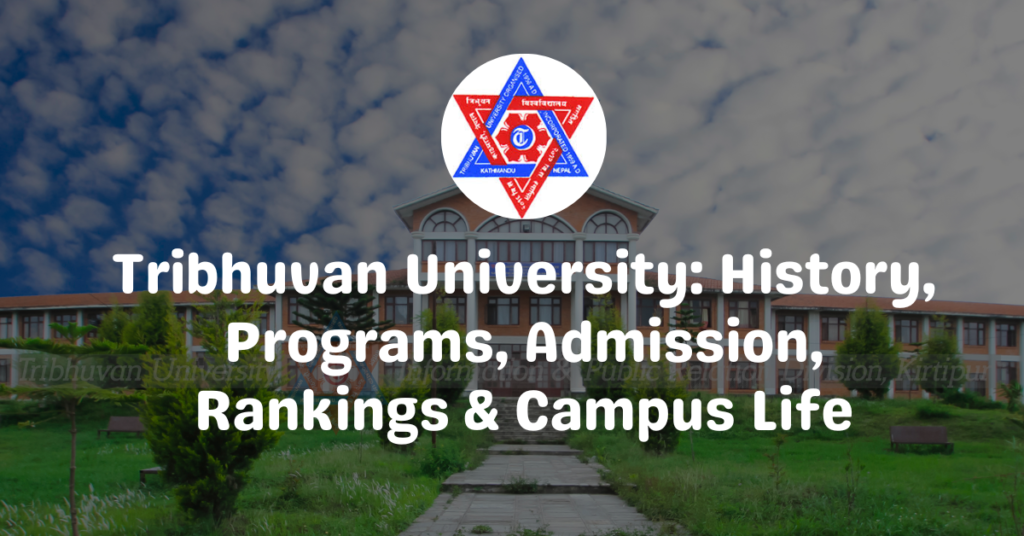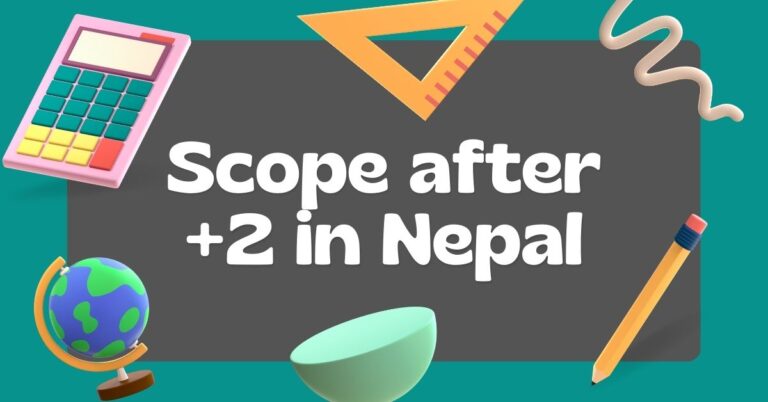Tribhuvan University – A Comprehensive Guide to Nepal’s Premier Academic Institution


Tribhuvan University (TU) is not just a higher education institution—it’s a cornerstone of academic development in Nepal. Founded in 1959, TU holds the distinction of being Nepal’s oldest and largest university. Whether you’re a local student exploring higher education opportunities or an international researcher delving into South Asian academics, TU is impossible to ignore. It has played a pivotal role in shaping Nepal’s socio-economic and political fabric by educating generations of thinkers, professionals, and leaders.
The university spans a wide spectrum of disciplines, from humanities and management to science, technology, and law. It caters to over 600,000 students annually across hundreds of constituent and affiliated colleges, making it one of the largest academic networks in South Asia. The sheer scale, diversity of programs, and depth of legacy make TU a fascinating subject for any educational exploration.
Let’s dive deeper into what makes Tribhuvan University not only historically significant but also academically relevant in today’s dynamic world.
Introduction to Tribhuvan University
A Glimpse into the Legacy
Tribhuvan University is a household name in Nepal. Ask any Nepali student, and chances are TU has either directly or indirectly played a role in their education. Established under the Tribhuvan University Act, it began its journey with just a handful of faculties and a limited student base. Fast-forward to today, and TU stands as a behemoth of higher education with more than 60 constituent campuses and over 1,100 affiliated colleges nationwide.
Its namesake, King Tribhuvan Bir Bikram Shah, was a forward-thinking monarch who envisioned education as the backbone of a prosperous nation. His vision has certainly borne fruit—TU continues to produce thousands of graduates annually who contribute in every sphere of society, from government and healthcare to technology and the arts.
Why Tribhuvan University Stands Out
Tribhuvan University offers several features that make it stand apart:
- Legacy and Trust: With over six decades of experience, TU has built unmatched credibility.
- Diverse Offerings: More than 2,000 academic programs across every imaginable field.
- Accessibility: Campuses and colleges spread throughout the country make higher education accessible even in remote areas.
- Research-Oriented: It has made significant contributions in the field of agriculture, environmental science, health, and sociology through dedicated research centers.
- Affordability: As a government-supported institution, TU remains cost-effective for students of all backgrounds.
In essence, TU is not just an educational institute; it’s a societal pillar, a national legacy, and a platform for endless opportunities.
History and Establishment
Founding Story of TU
The official birth of Tribhuvan University occurred on July 14, 1959. Back then, Nepal was still an emerging nation grappling with the need for modern infrastructure, education being the most critical component. King Tribhuvan, after whom the university is named, was a strong proponent of education as a means of nation-building.
The first academic session of TU was modest—just a few hundred students and minimal infrastructure. However, the university’s charter was ambitious: to provide quality education, foster research, and promote intellectual freedom. The university was located in Kirtipur, a quiet hilltop village that would soon transform into a buzzing academic hub.
Within a decade of its founding, TU had already launched several faculties, including Humanities, Social Sciences, and Science and Technology. It began affiliating private colleges in the 1970s, thus multiplying its reach exponentially.
Evolution Through the Decades
From chalkboards in dusty classrooms to advanced research labs and digital platforms, TU has evolved remarkably. Here’s a timeline snapshot:
- 1960s–70s: Rapid expansion of faculties and campuses.
- 1980s: Integration of technical institutes and postgraduate studies.
- 1990s: Emergence as a research powerhouse.
- 2000s: Inclusion of more professional programs like MBBS, BBA, and IT.
- 2010s–Present: Focus on modernization, online learning, and global partnerships.
Despite facing political challenges and funding constraints, TU has maintained its relevance by continuously adapting to educational trends. The introduction of distance learning, international collaborations, and modern research methodologies are just a few examples of how TU stays ahead.
Tribhuvan University at a Glance
TU’s Structure and Governance
Tribhuvan University operates under a unique semi-autonomous governance model. It is funded primarily by the Government of Nepal but has the autonomy to design curricula, approve colleges, and conduct examinations independently.
The key administrative units include:
- The Chancellor: Usually the Prime Minister of Nepal.
- The Vice-Chancellor: The chief executive responsible for day-to-day operations.
- Registrar and Rector: Senior officials who manage academic and financial functions.
Decision-making flows from the University Senate, the highest policy-making body, to the Executive Council and Academic Council, which oversee operational and academic matters, respectively.
Quick Stats and Figures
- Founded: 1959
- Main Campus: Kirtipur, Kathmandu
- Total Students: Over 600,000
- Constituent Campuses: 62+
- Affiliated Colleges: 1,100+
- Faculties: 4 main faculties, 5 technical institutes
- Programs Offered: 2,000+ in total
- Full-time Professors: 7,500+
- Research Centers: 30+
These numbers paint a picture of a robust, far-reaching academic ecosystem that influences not just Nepal but the wider South Asian region.
Academic Programs Offered
Undergraduate Programs
Tribhuvan University offers a wide array of undergraduate degrees, designed to cater to various career paths and academic interests. The Bachelor’s programs are structured with both core and elective subjects, fieldwork, and in some cases, internships.
Popular UG Programs at TU:
- BSc (Bachelor of Science)
- BA (Bachelor of Arts)
- BBA (Bachelor of Business Administration)
- B.Ed (Bachelor of Education)
- LLB (Bachelor of Laws)
- B.Tech (Bachelor of Technology)
- MBBS (Bachelor of Medicine, Bachelor of Surgery)
The curriculum is designed to be comprehensive and practical. For example, the BBA program includes modules on entrepreneurship, marketing, and finance, plus a final year project and internship to give students real-world exposure.
Postgraduate and Doctoral Degrees
TU is equally reputed for its master’s and doctoral offerings. Master’s programs typically span two years and include a thesis component. The university also offers an MPhil program, which acts as a bridge between Master’s and PhD for research-inclined students.
Popular PG Programs:
- MA in Economics, Sociology, Psychology, etc.
- MBA
- MSc in various scientific fields
- M.Ed and M.Phil
- PhD across all major disciplines
Research scholars at TU have access to advanced labs, field study programs, and international journals, which makes the doctoral programs intellectually rewarding.
Technical and Vocational Courses
The technical institutes under TU, such as the Institute of Engineering (IOE), Institute of Medicine (IOM), and Institute of Agriculture and Animal Science (IAAS), offer diploma, certificate, and degree programs that are career-oriented and globally relevant.
Whether it’s a diploma in electrical engineering or a bachelor’s in veterinary science, these courses bridge the gap between academic learning and employable skills.
Faculties and Institutes
Overview of Main Faculties
Tribhuvan University is structured into four major faculties: Humanities and Social Sciences, Management, Education, and Law. Each faculty operates with its own dean’s office, academic departments, and research centers, catering to a diverse student population.
- Faculty of Humanities and Social Sciences (FOHSS):
One of the oldest faculties, FOHSS offers programs in Sociology, Psychology, Anthropology, Economics, Journalism, and Political Science. It emphasizes critical thinking, research, and practical fieldwork. The faculty also plays a key role in publishing journals and hosting national conferences. - Faculty of Management (FOM):
The most sought-after faculty for students interested in business, finance, and entrepreneurship. Programs like BBA, BIM, BBS, MBA, MPA, and MBM are designed to meet modern corporate standards. Case studies, presentations, group discussions, and internships form an integral part of the teaching methodology. - Faculty of Education (FOE):
With programs tailored for future educators, FOE focuses on curriculum development, pedagogy, psychology, and administration in schools. The Bachelor of Education (B.Ed) and Master of Education (M.Ed) programs are nationally recognized and widely pursued. - Faculty of Law (FOL):
Offers LLB and LLM degrees, preparing students for legal practice, judiciary roles, and academic careers. Courses include Criminal Law, Constitutional Law, International Law, and Legal Ethics. Moot court sessions and legal aid camps give students real-world exposure.
Notable Institutes Under TU
Besides the four major faculties, Tribhuvan University houses five technical institutes that specialize in professional and scientific disciplines:
- Institute of Engineering (IOE) – The powerhouse for aspiring engineers in Nepal. IOE’s Pulchowk Campus is particularly prestigious.
- Institute of Medicine (IOM) – The go-to for medical education, offering MBBS, MD, BPH, Nursing, and other healthcare-related programs.
- Institute of Agriculture and Animal Science (IAAS) – Focuses on modern agricultural sciences, livestock, horticulture, and agribusiness.
- Institute of Forestry (IOF) – Offers education in forest management, wildlife conservation, and environmental science.
- Institute of Science and Technology (IOST) – Covers disciplines like Physics, Chemistry, Biology, Mathematics, and Computer Science.
Each institute operates semi-autonomously, with state-of-the-art labs, research facilities, and experienced faculty.
Research and Innovation Wings
Research is central to TU’s academic mission. The university has established several research centers such as:
- Research Centre for Educational Innovation and Development (CERID)
- Centre for Economic Development and Administration (CEDA)
- Research Centre for Applied Science and Technology (RECAST)
These centers promote high-quality research through funding, international collaboration, and publication in peer-reviewed journals. Faculty members and students are encouraged to undertake interdisciplinary studies that impact national policies and contribute to global knowledge.
Admission Process at Tribhuvan University
Eligibility Criteria
Admission to Tribhuvan University varies depending on the level and type of program. However, there are some general eligibility requirements:
- For Bachelor’s Programs: Completion of 10+2 or equivalent with minimum GPA as defined by each faculty.
- For Master’s Programs: A bachelor’s degree in a relevant field from a recognized university.
- For MPhil and PhD Programs: A master’s degree with a minimum CGPA or second division and a research proposal.
In technical programs like MBBS, Engineering, and BSc Agriculture, there are strict eligibility criteria, often requiring students to pass rigorous science-focused entrance exams.
Entrance Examinations and Merit List
Entrance exams are a vital part of the TU admission process. These are typically conducted once a year and are both competitive and comprehensive. Faculties and institutes have their own entrance formats. For instance:
- IOE conducts its own Computer-Based Test (CBT)
- IOM organizes centralized MBBS entrance exams
- Faculty of Management (FOM) requires CMAT (Central Management Admission Test)
Admission is granted based on the merit list derived from entrance scores, past academic records, and interviews (if applicable). This merit-based approach ensures fairness and academic excellence.
Scholarships and Financial Aid
Tribhuvan University is committed to making education accessible. It offers a variety of scholarships:
- Merit-Based Scholarships: Awarded to toppers in entrance exams and university exams.
- Need-Based Scholarships: Provided to students from underprivileged backgrounds.
- Reserved Quota Scholarships: For marginalized groups like Dalits, Janajatis, and women.
- Foreign Student Scholarships: Offered occasionally through bilateral educational agreements.
In addition to internal scholarships, many affiliated colleges under TU provide their own financial aid programs, easing the burden of tuition and hostel fees.
TU’s National and International Ranking
TU in Nepal’s Education Landscape
Tribhuvan University consistently ranks as the top university in Nepal. It is often the first choice among students, not only due to its extensive network but also its academic reputation. The majority of professionals in government, media, business, and academia are TU alumni.
Its consistent output of qualified graduates, credible research, and community service projects has established TU as the educational backbone of Nepal. The Nepalese government continues to prioritize TU for policy-making, educational reform, and budget allocation.
International Rankings and Accreditation
Though TU faces competition from emerging private universities, it still maintains a respectable international standing. According to Webometrics and UniRank:
- TU is ranked among the top 100 universities in South Asia.
- It is placed within the top 3,000 universities worldwide on several platforms.
- TU has received recognition from UGC (University Grants Commission, Nepal) and international accrediting agencies in Asia.
Moreover, programs under institutes like IOE and IOM have received accreditation from international councils and are recognized in countries such as India, China, the USA, and the UK. This global acknowledgment facilitates TU graduates in pursuing higher studies or employment abroad.
In recent years, TU has also signed academic collaboration agreements with foreign universities in countries like Japan, Germany, Australia, and the USA, enhancing its research capabilities and student exchange opportunities.
Campus Life at Tribhuvan University
TU Student Culture and Community
Life at Tribhuvan University is vibrant and culturally rich. Spread over 154 hectares of land in Kirtipur, the central campus alone hosts thousands of students daily. The university promotes a sense of community, diversity, and inclusivity.
Students come from all seven provinces of Nepal and even from neighboring countries, creating a multicultural academic environment. TU celebrates festivals, organizes departmental functions, and supports clubs and associations for students’ social development.
Clubs such as debating societies, arts collectives, coding groups, and youth wings of political parties play a big role in shaping campus culture. Political awareness is high among TU students, and many prominent national leaders started their political careers here.
Extracurricular and Co-curricular Activities
Tribhuvan University doesn’t just focus on academics. Extracurricular activities are encouraged to ensure holistic development. These include:
- Sports Events: TU has football, cricket, volleyball, and athletics teams that compete nationally.
- Debates and Public Speaking: Regular inter-campus debates and elocution contests are held.
- Cultural Programs: Dashain, Holi, Tihar, and International Day celebrations bring joy to the campus.
- Workshops and Seminars: Organized by faculties and student groups on entrepreneurship, technology, mental health, and more.
Events like TU Youth Fest and departmental symposiums bring together students from across the country and offer networking opportunities.
Hostels, Food, and Facilities
TU provides residential facilities for both male and female students. The hostels are basic but affordable, offering shared rooms, canteens, and common study areas.
On-campus amenities include:
- Libraries: The central library at Kirtipur holds over 400,000 books and journals.
- Computer Labs: Equipped with internet access and specialized software.
- Health Services: A medical unit operates to provide emergency care and basic treatment.
- Cafeterias: Serve local and continental food at student-friendly prices.
Efforts are underway to upgrade facilities, install Wi-Fi zones, and digitalize library resources. The overall environment encourages students to learn, live, and grow within the TU community.
Affiliated Colleges and Their Impact
List of Popular Affiliated Colleges
One of the unique aspects of Tribhuvan University is its extensive network of affiliated colleges, which dramatically amplifies its reach and influence. These colleges are scattered across all provinces of Nepal, making TU’s academic programs accessible even in the most remote corners of the country.
Here are some of the most well-known TU-affiliated colleges:
- St. Xavier’s College, Kathmandu – Known for high academic standards and holistic education.
- Shanker Dev Campus – Premier institution for business and management studies.
- Patan Multiple Campus – Offers diverse programs in humanities, science, and commerce.
- Amrit Science Campus (ASCOL) – One of the top science colleges in Nepal.
- Tri-Chandra College – Historical campus offering science, arts, and humanities programs.
- Kathmandu Bernhardt College – Popular among students seeking flexible, private education under TU.
- College of Applied Business (CAB) – Offers BBA and MBA programs with a strong practical approach.
These colleges operate under TU’s academic umbrella, meaning they follow the university’s curriculum, conduct TU-regulated exams, and award TU-certified degrees. This has made the quality and recognition of education more uniform across the country.
How Affiliations Work at TU
Tribhuvan University governs its affiliated colleges through strict protocols and regular audits. Every affiliated college must:
- Meet infrastructure and faculty qualifications as defined by TU.
- Follow the academic calendar and curriculum issued by the university.
- Undergo quality assessments for continued affiliation.
- Submit students to central TU exams for evaluation.
TU’s affiliation model allows private and community colleges to operate under its academic brand, thus expanding education without diluting standards. These affiliations also help reduce the government’s burden of establishing campuses in every district while allowing for local ownership of educational institutions.
Moreover, TU regularly organizes training and orientation programs for faculty members from affiliated colleges to ensure they are up to date with modern pedagogical techniques. This collaboration has successfully created a unified and accessible education system across Nepal.
Notable Alumni of Tribhuvan University
Prominent Figures in Politics, Academia, and Arts
Tribhuvan University has a long list of distinguished alumni who have made significant contributions both nationally and internationally. From politics to science, the arts to academia, TU graduates are at the forefront of leadership and innovation.
In Politics:
- Sher Bahadur Deuba – Former Prime Minister of Nepal and TU law graduate.
- Madhav Kumar Nepal – Veteran politician and TU alum with a background in economics and political science.
- Baburam Bhattarai – Former Prime Minister and a PhD scholar who began his academic journey at TU.
In Academia:
- Dr. Govinda KC – Renowned orthopedic surgeon and education activist.
- Prof. Dr. Kedar Bhakta Mathema – Former TU Vice-Chancellor and UNESCO education advisor.
In Arts and Literature:
- Parijat (Bishnu Kumari Waiba) – One of Nepal’s greatest literary figures, studied at TU.
- Hari Bansha Acharya – Celebrated actor, comedian, and social activist.
- Manjushree Thapa – Acclaimed author and literary critic, known internationally.
Alumni Contributions to Global Society
Many TU graduates have made their mark globally. A number of them are:
- Working in top international organizations like the UN, WHO, and World Bank.
- Pursuing advanced research in Ivy League universities.
- Founding impactful NGOs and startups in fields like education, health, and clean energy.
These success stories are testaments to the robust foundational education that TU provides. They also act as an inspiration for current and future students, highlighting that one can achieve global recognition, starting from Nepal’s oldest university.
To honor and engage its alumni, TU occasionally organizes alumni meets, invites distinguished graduates for guest lectures, and includes their success stories in official publications.
Digital and Online Learning Initiatives
TU’s Response to Modern Education Demands
In today’s digital era, education is no longer confined to classroom walls. Recognizing this, Tribhuvan University has gradually adopted digital technologies to meet the needs of 21st-century learners.
TU’s digital transformation gained momentum during the COVID-19 pandemic, which forced the closure of physical campuses. Since then, the university has:
- Introduced online classes using platforms like Zoom, Google Meet, and MS Teams.
- Established digital learning management systems (LMS) for resource sharing.
- Encouraged faculty to create video lectures and recorded tutorials.
- Offered training to teachers in using digital tools and e-pedagogy.
Though still in its early stages, this shift toward digital learning is helping TU remain competitive and accessible.
E-learning Platforms and Distance Programs
Tribhuvan University has rolled out several initiatives for distance and online education:
- Open and Distance Education Center (ODEC): A dedicated wing to promote online learning. Offers degrees and training programs using a blended learning model.
- E-Library Services: Students and faculty can now access thousands of e-books, journals, and research articles through TU’s central library portal.
- Virtual Labs: Especially in science and IT programs, some practical modules are now simulated digitally.
These steps are essential not only for reaching remote learners but also for aligning TU with global trends in digital education. In the future, the university plans to introduce MOOCs (Massive Open Online Courses) and virtual reality modules for technical training.
Partnerships and Global Collaboration
MOUs and Exchange Programs
Globalization has made academic collaboration a necessity. Tribhuvan University actively signs Memorandums of Understanding (MOUs) with international universities to promote:
- Faculty exchange programs
- Student exchange schemes
- Joint research projects
- Collaborative conferences and publications
Some of the notable partner universities include:
- University of Tokyo, Japan
- Heidelberg University, Germany
- University of Bergen, Norway
- Tribhuvan University of Punjab (India)
- University of New South Wales (Australia)
These partnerships not only expose TU students to global classrooms but also raise the university’s profile internationally.
TU’s Role in International Research
Tribhuvan University is frequently involved in international research projects in collaboration with global think tanks and research institutions. Fields like climate change, agriculture, public health, gender studies, and sustainable development see high TU participation.
The university also hosts foreign scholars through programs like Fulbright, Erasmus+, and South Asian regional fellowships. This two-way knowledge flow enriches the academic ecosystem and nurtures innovation.
International collaboration also opens doors for grants, scholarships, and access to foreign labs and libraries—further enhancing TU’s academic strength.
Challenges and Criticisms
Administrative and Political Issues
Despite its achievements, Tribhuvan University is not without its fair share of challenges. Critics often point out the following:
- Political Interference: Student unions and faculty appointments are sometimes influenced by political agendas.
- Outdated Curriculum: Many programs are yet to be updated to meet modern industry demands.
- Delayed Results and Exams: TU has a reputation for postponing exams and publishing results late, causing academic delays.
- Infrastructure Problems: Some rural campuses lack basic facilities like libraries, labs, and clean hostels.
These issues, if left unaddressed, could erode the trust and credibility TU has built over decades.
Steps Toward Reform and Transparency
TU leadership is aware of these challenges and has taken several steps:
- Curriculum revision projects in collaboration with foreign consultants.
- Digitization of exams and student records to reduce administrative delays.
- Student feedback systems to involve learners in quality assurance.
- Capacity building programs for faculty to reduce political influence.
Though reform is slow, it is steady. With continued government support and international collaboration, Tribhuvan University is poised for a brighter, more accountable future.
Conclusion
Final Thoughts on TU’s Legacy and Future
Tribhuvan University is more than just Nepal’s oldest university—it’s a national institution that has shaped the academic, political, and social fabric of the country for over six decades. With over 600,000 students spread across hundreds of constituent and affiliated colleges, TU has been a symbol of educational accessibility, equity, and excellence in Nepal. Its campuses are not just places of learning but cradles of leadership, creativity, and activism.
Despite its age, TU continues to evolve. It has adapted to the digital age, launched online learning initiatives, and strengthened global partnerships. Its commitment to inclusivity, research, and modernization shows that TU is not resting on its historical laurels. Instead, it’s taking steady steps toward becoming a 21st-century academic hub.
However, the road ahead isn’t without hurdles. Issues like political interference, delayed results, and infrastructural limitations persist. But these are not unique to TU—they’re challenges faced by most public universities in developing nations. What makes TU stand out is its resilience and relentless pursuit of progress. The leadership has already initiated reforms, curriculum overhauls, and transparency mechanisms that could redefine the academic culture of the university.
If you’re a student aspiring to be part of a rich academic heritage, a researcher seeking fertile intellectual ground, or simply a curious reader looking to understand Nepal’s higher education landscape, Tribhuvan University is an institution worth knowing and celebrating.
TU’s legacy is a testament to Nepal’s commitment to education, and its future promises innovation, inclusion, and impact.
FAQs
1. What are the admission requirements for Tribhuvan University?
Admission requirements at Tribhuvan University vary depending on the program. For bachelor’s degrees, applicants typically need to have completed their 10+2 or equivalent education. For postgraduate degrees, a relevant bachelor’s degree is required. Many faculties conduct entrance exams, such as the CMAT for management courses or IOE’s engineering test. International students may have additional documentation requirements, including visa clearance and academic equivalency.
2. Is Tribhuvan University recognized internationally?
Yes, Tribhuvan University is recognized internationally and its degrees are accepted in many countries, including India, the US, Canada, and European nations. Many TU graduates go on to pursue higher education abroad or secure jobs in multinational organizations. Specific institutes under TU, such as the Institute of Medicine and the Institute of Engineering, are particularly well-regarded internationally. TU also collaborates with global universities for research, student exchange, and faculty development.
3. How many faculties are under Tribhuvan University?
Tribhuvan University has four main faculties:
- Faculty of Humanities and Social Sciences
- Faculty of Management
- Faculty of Education
- Faculty of Law
In addition, there are five technical institutes:
- Institute of Engineering (IOE)
- Institute of Medicine (IOM)
- Institute of Agriculture and Animal Science (IAAS)
- Institute of Forestry (IOF)
- Institute of Science and Technology (IOST)
Each faculty and institute has its own departments, programs, and campuses under TU’s broad academic umbrella.
4. What is the official website of Tribhuvan University?
The official website of Tribhuvan University is:
👉 https://tribhuvan-university.edu.np
Here, you’ll find resources such as admission notices, results, academic calendars, research publications, faculty contacts, and news updates. TU’s site is also the primary portal for digital learning tools, scholarship announcements, and university policy documents.
5. Does TU offer online or distance learning programs?
Yes, Tribhuvan University offers online and distance education through the Open and Distance Education Center (ODEC). This center provides blended learning programs combining online lectures, assignments, and limited in-person interactions. Many programs now include recorded lectures, online submissions, and digital exams. TU has embraced platforms like Google Meet and Zoom to ensure continuity of education, especially during the COVID-19 pandemic.
TU is also expanding its digital infrastructure with plans to launch fully online degrees and certificate programs in the near future, especially for rural students and working professionals.







